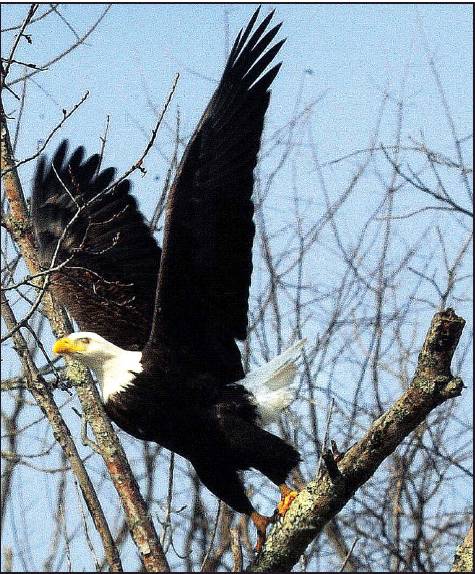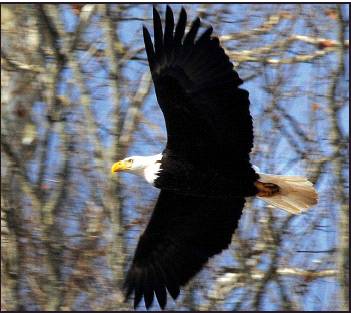Bald Eagles Seen on Monongahela
Birds also appeared last winter at lock, dam
Morgantown Dominion Post
9 December 2010

A bald eagle (above) prepares to launch from a
treenear the Morgantown Lock and
Dam on Wednesday. The bald eagle (below) glides through the air toward
the Mon
River, perhaps to swoop down on a fish. -.Ron Rittenhouse - Dominion
Post photos

The symbol of America was seen flying Wednesday over the
Monongahela River.
Workers at the Morgantown Lock and Dam spotted a bald
eagle in the area and contacted The Dominion Post to take photos.
Lock and Dam operator Jeff Helmick said they first saw the
bald eagle along the Mon last winter.
“We’ve been watching it all year,” Helmick said. “It flies
up the river.”
Helmick said the bird is aweinspiring and is at its most
impressive when it fishes in the river.
Mature male and female bald eagles look alike, so it is
difficult to tell them apart, said Susan Olcott, the diversity
biologist for the state Division of Natural Resources’ District 1.
Olcott said there were at least 36 breeding pairs in West
Virginia in 2010, plus an additional number of lone birds and eaglets.
Marilyn Bowman, with the West Virginia Raptor
Rehabilitation Center, said the bald eagle previously was on the
endangered species list, but is now only considered threatened.
The birds continue to be protected under federal law.
According to the U.S. Fish and Wildlife Service, the Bald
and Golden Eagle Protection Act of 1940, amended as recently as 1994,
protects the birds “by prohibiting the take, possession, sale,
purchase, barter, offer to sell, purchase or barter, transport, export
or import, of any bald or golden eagle, alive or dead, including any
part, nest, or egg, unless allowed by permit.”
Violations of the act call for a fine up to $5,000 or a
year in prison with a $10,000 fine, or no more than two years
imprisonment for a second offense. Felony convictions carry heavier
penalties including fines up to $250,000 and two years in jail. If an
organization is involved in the violation, fines can double.
The federal government offers rewards for information
leading to the arrest and conviction of anyone violating the act.

